Yesterday shaped today just as today will shape tomorrow. Our world right now is a product of decisions and actions from previous generations that continue to set the tone for where we’re heading.
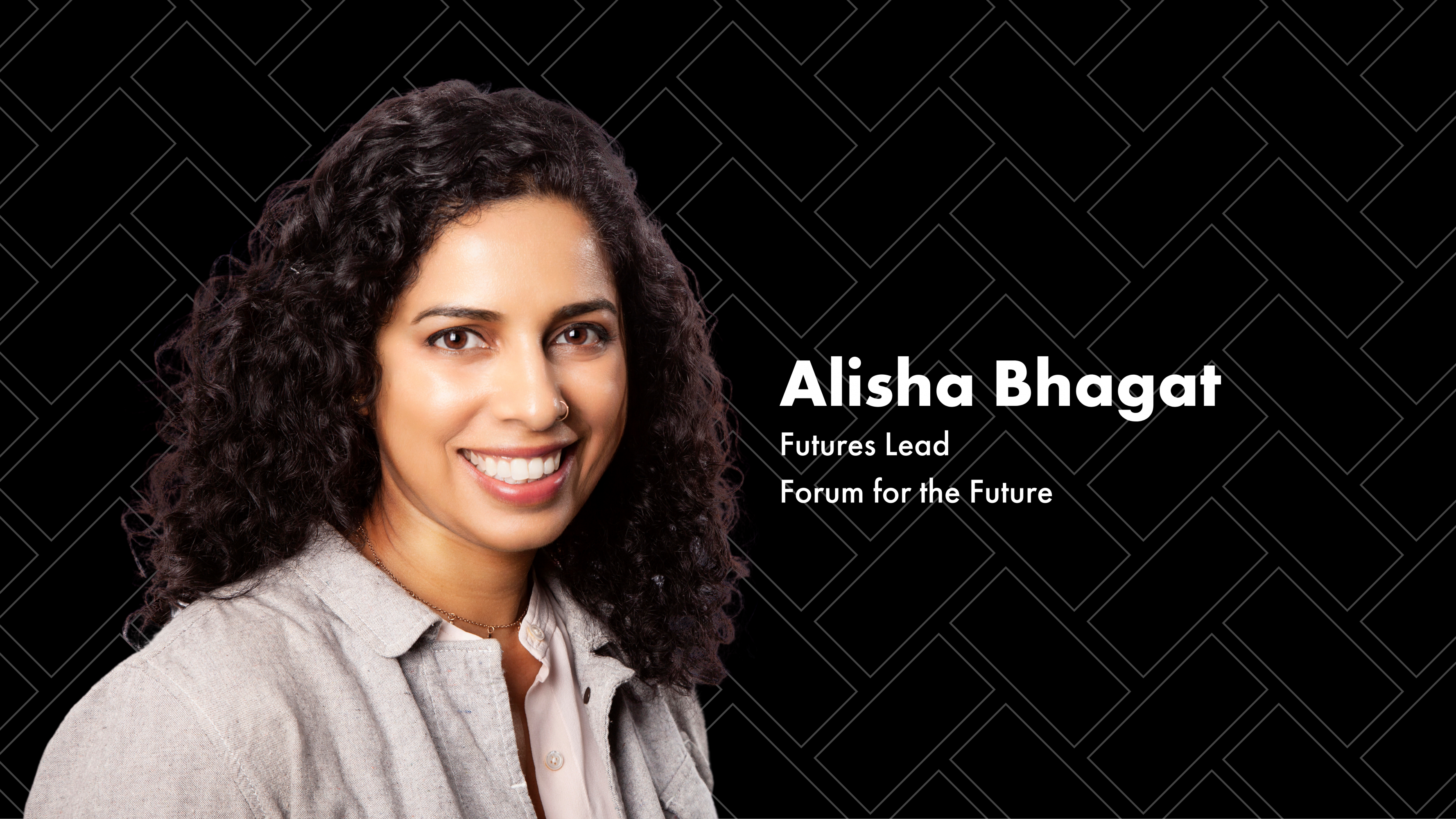
In the second part of our Future of Sustainability: Looking Back to Go Forward commentary series, Alisha Bhagat, Forum’s Futures Lead explores the importance of understanding where we’ve been and how we got here if we’re to create the future we want.
Many of us have spent lifetimes listening to the same repetitive growth-oriented stories: the rise of empires; the American dream; the gospel of prosperity. Each of these points to a dominant narrative that we are all on an upward trajectory that will lead us to greater happiness. Yet, in this moment of great disruption in which the pandemic, inequality, and climate crises continue to expose deep-rooted faultlines in the way we currently live, work and interact, we are becoming very aware that this set of stories and frameworks quite simply no longer serves.
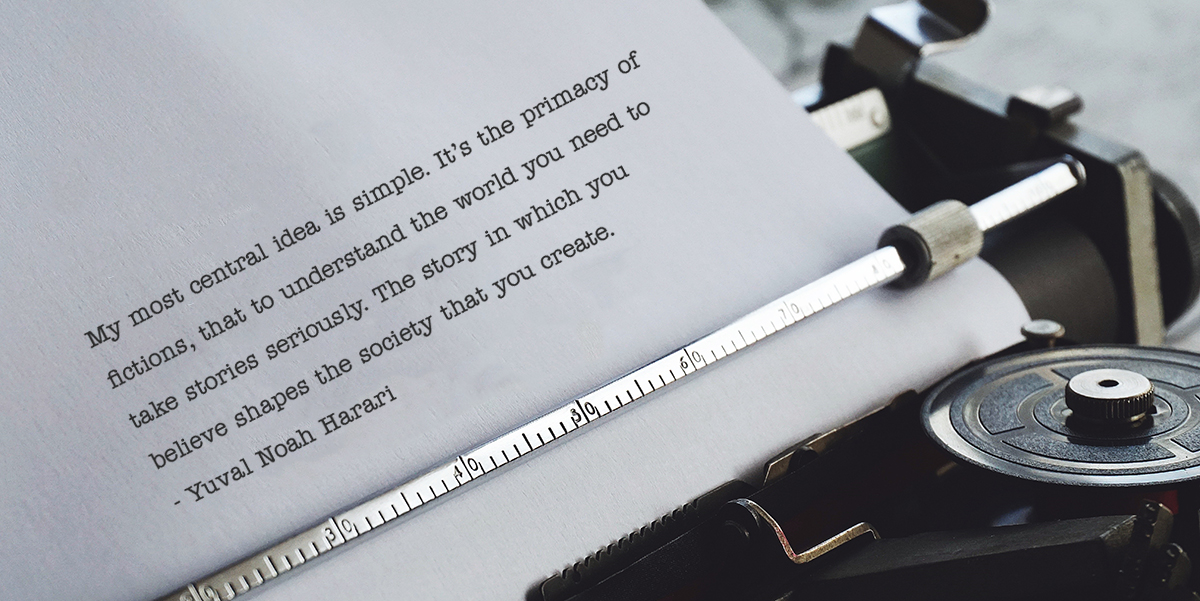
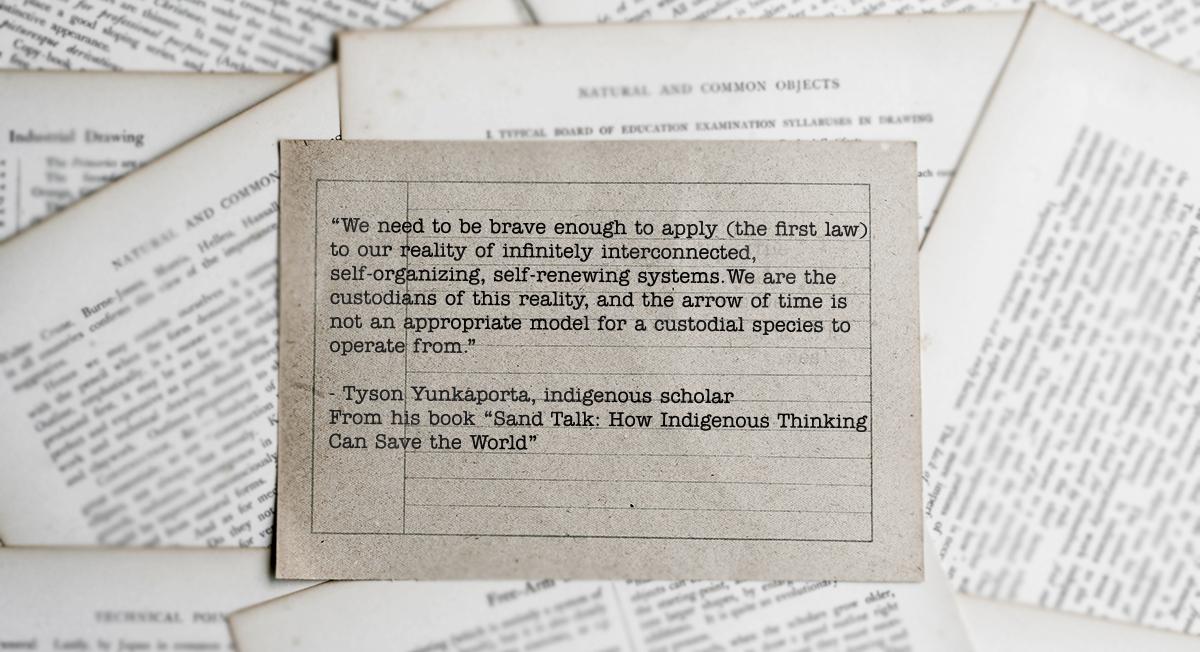
As a futurist, when I work with groups on visioning for the future, I often start with discussing present-day systems that seem as if they have existed forever. Systemic and cyclical inequality, diminishing biodiversity and disposable, high-waste consumer culture and more all seem an inevitable part of growth.
Yet a look backwards shows us that not only are these relatively new developments in human history, but that we believed in them because of larger structural forces that arguably continue to shape the way we think and act within the world. Most importantly, thinking about these flawed systems as historical human constructs – created by a subgroup of people for specific aims – can help us understand and change them.
Just as our actions and decisions shaped the past, so too will they impact the future. We have a moral imperative to stop passively experiencing the future, and to deeply understand it so that we can better act. To be able to create a better future together, we need to start with examining who we are and how we got to the crises we are currently in.
That’s why the Future of Sustainability series is set to look back: armed with lessons learned and candid ownership of where we have previously succeeded, failed and why, we can better prepare and upskill ourselves to make more informed decisions about what’s really needed.
To quote the writer and philosopher George Santayana: “Those who cannot remember the past are condemned to repeat it.” A terrifying prospect given more than three decades of institutionalized sustainability efforts have not taken us to where we need to be. It is important that we not only remember the past, but as futures thinkers search for patterns and examine alternative worldviews. It’s becoming increasingly clear that we cannot solve current and future challenges with systems unquestioningly inherited.
Exploring past lessons – good and bad – is how we learn, and learn quickly. After all, time is not on our side if we’re to tackle multifaceted challenges from escalating climate and biodiversity issues to growing inequality, a global health crisis and an urgent need for economic reform. A global system that relentlessly pursues profit at the cost of living creatures and our beloved planet Earth, cannot continue indefinitely. Our societies, technologies, cultures, ideologies – the very systems we’re trying to change – have all been shaped by history. Appreciating what has and has not worked is vital as we look to innovate, inspire and drive change
To explore this further and to better understand the ways in which we shape and are shaped by the past and future, I sat down with two time travellers: Dr. Nandini Pandey, Associate Professor of Classics at Johns Hopkins University; and Nour Batyne, Creative Producer, Facilitator and Artist whose work lies at the intersection of immersive storytelling, futures thinking and social innovation
While Nandini studies the ancient past and Nour tells stories about the near future, both think about the entanglement of different temporalities and the ways that diverse stories help us understand how to be and act today.
Highlights from our conversation on November 3, 2021, are captured below.
Considering the future as ‘historia’ – a place of living inquiry
Having spoken with Nour and Nandini, I’ve been left with a radical thought: how can we think about our past and future as historia – a place of living inquiry. Understanding both past and future requires perpetual talking and questioning. We are not headed down a fixed path. We have the potential to unearth new stories, ones that make room for multiple layered futures, that are able to hold different and diverse perspectives at the same time, and that repeat, regenerate, and renew.
The past is an intriguing place full of lessons for all of us. Not just in respect to discrete events, but in the systems, worldviews and cultures that have emerged from the way our ancestors saw and shaped our world. It’s now time for us to deliberately examine where we are right now, where we’ve been – and where we’re heading if we’re to fulfill our duty to future generations.
This transition must revive traditional practices while also discovering new ways of being. It must shift away from systems that no longer serve our fragile planet and the people who call it home. We need to fundamentally move from being a consumptive species to, as Tyson Yunkaporta so beautifully captures, a “custodial” one – and in doing so, intentionally leave no one behind. Why not start sharing your lessons right now?
In conversation with time travellers….
To better understand the ways in which we shape and are shaped by the past and future, I sat down with two time travellers: Dr. Nandini Pandey, Associate Professor of Classics at Johns Hopkins University; and Nour Batyne, Producer and Creative Director of Resilience 2032, social media theater about the future.
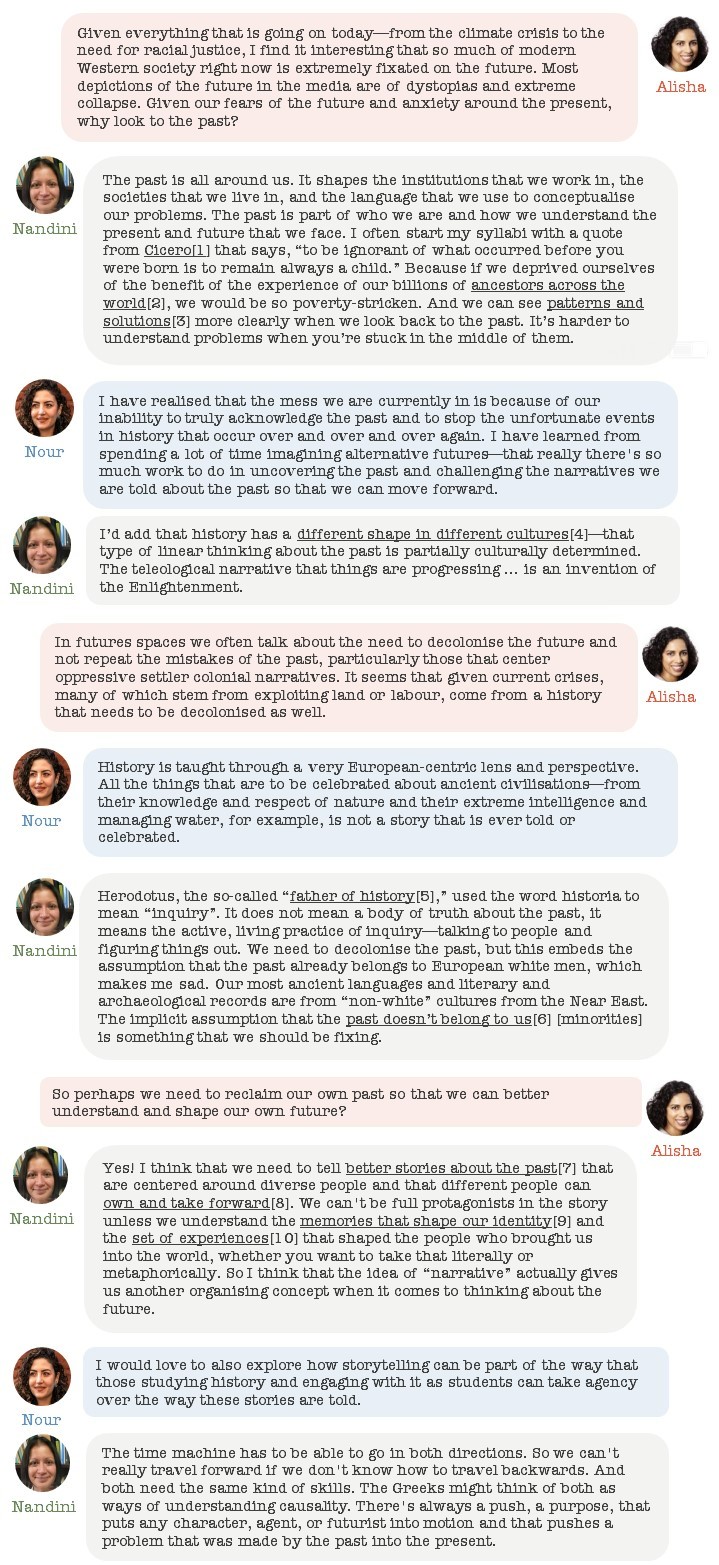
- Nandini Pandey
An associate professor of classics trained at Swarthmore, Oxford, Cambridge, and Berkeley, Nandini Pandey is author of The Poetics of Power in Augustan Rome (Cambridge, 2018) and numerous articles in academic journals and public-facing venues from Eidolon to Hyperallergic. She is currently writing a book on Roman diversity and helping build a new consortium called Pasts Imperfect that connects diverse modern views on global antiquities with a wider public.
- Nour Batyne
Nour Batyne is a creative producer, facilitator, and artist whose work lies at the intersection of immersive storytelling, futures thinking, and social innovation. With a global portfolio of work, she is currently based in New York and serves as an Associate Instructor in the M.S. in Nonprofit Management program at Columbia University. Nour is a Next Generation Foresight Practitioner Fellow at the School of International Futures and a member of the Wide Awakes, an open-source network who radically reimagine the future through creative collaboration.
Further reading on the importance of history to futures
- Eidolon: an online journal (2015-2020) voicing diverse modern perspectives on Greco-Roman antiquity and its future study
- Pasts Imperfect: a network publishing fresh views on global antiquities and their contemporary relevance through a weekly Substack newsletter, a monthly column in the LA Review of Books, and more
Watch this space
The next in our Future of Sustainability: Looking Back to Go Forward series sees Forum’s Founder Director, environmental activist, campaigner and author, Jonathan Porritt, in conversation with Forum’s Ivana Gazibara as we begin our exploration of where we’ve been, our successes, failures and lessons learned.
Footnotes:
[1] Cicero’s quote, Loeb Classical Library
[2] Crossing Cultures as a First-Generation Classist, eidolon.pub
[3] What are you Going to do with that Classics Degree? eidolon.pub
[4] Philosophy of History, Wikipedia
[5] Guide to the classics: The Histories, by Herodotus, The Conversation
[6] White People Explain Classics to Us, eidolon.pub
[7] He Wants to Save Classics From Whiteness. Can the Field Survive?, The New York Times Magazine
[8] South Asian in Classics: An Intergenerational Conversation, Society for Classical Studies
[9] Crossing Cultures as a First-Generation Classist, eidolon.pub
[10] The Authorial Lie: how scholars fabricate authority by erasing their identities, Donna Zuckerberg
About the Future of Sustainability: Looking Back to Go Forward
Produced by international sustainability non-profit, Forum for the Future, the Future of Sustainability: Looking Back to Go Forward is a unique opinion and commentary series set to explore lessons learned from the last 25 years in the sustainability movement and what they mean for the future.
Based on new and exclusive insights from diverse voices across the sustainability movement, we’ll examine where we have succeeded and where we have failed in creating real change. We’ll consider how the world is responding to today’s multifaceted challenges and opportunities, and what pivots might be needed if we’re to deliver at scale and pace. Lastly, we’ll look forward – exploring how we can reframe the goals of the system, reset our ambition, and encourage the adoption of new mindsets and approaches critical to creating what’s really needed: a truly just and regenerative future.
With thanks to our partners
Looking Back to Go Forward was made possible thanks to the generous support from our partners: Laudes Foundation, GSK, Target, M&S, Capgemini, Bupa, 3M, Burberry, CTPA, Olam Food Ingredients, and in particular our headline sponsor, SC Johnson
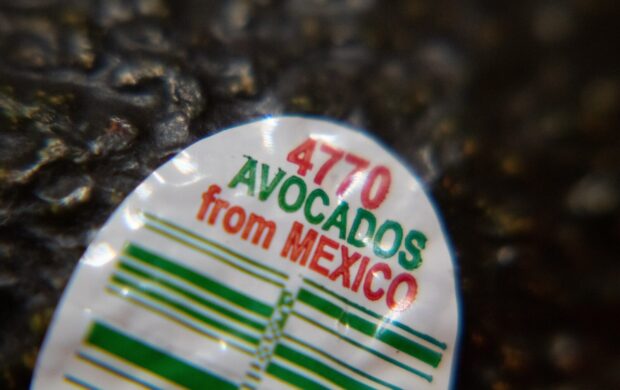
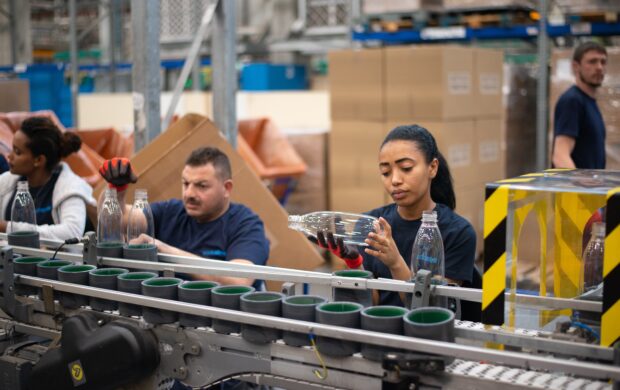
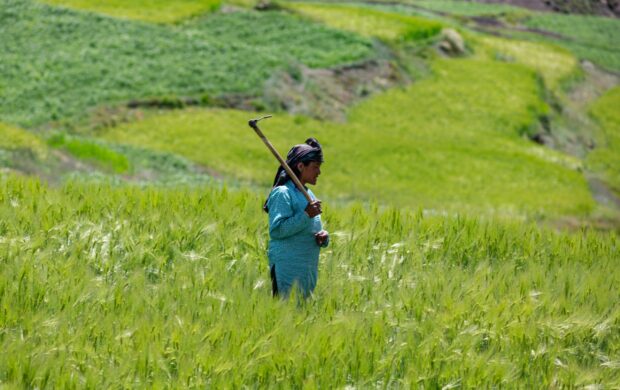

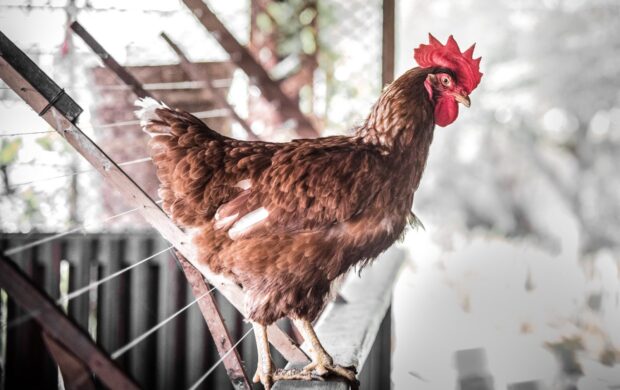

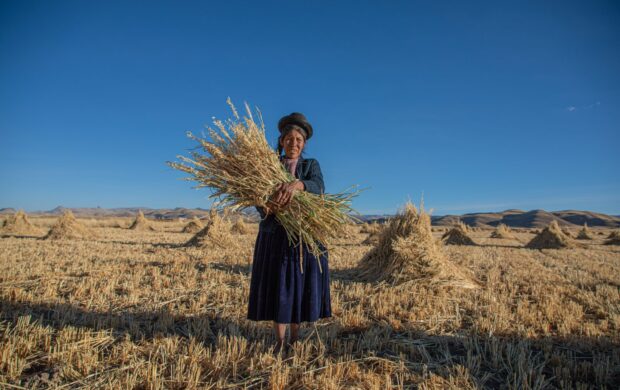
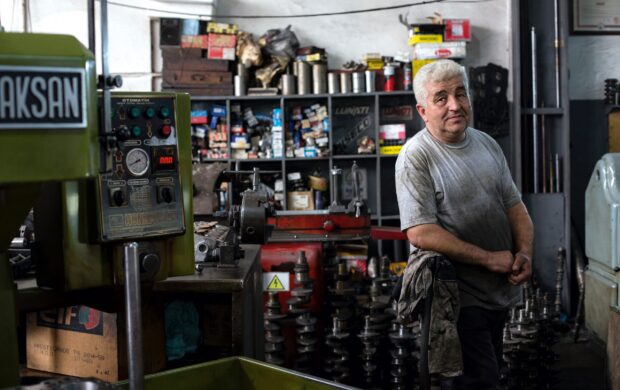

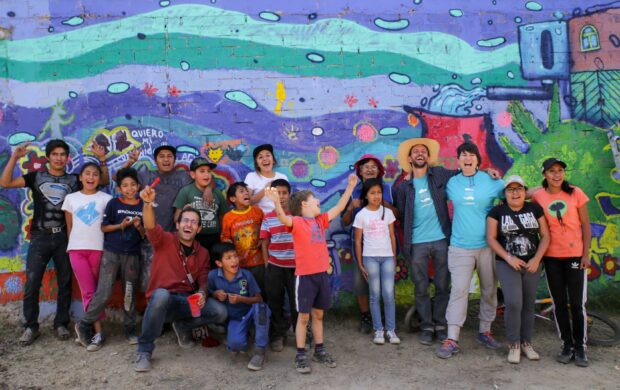

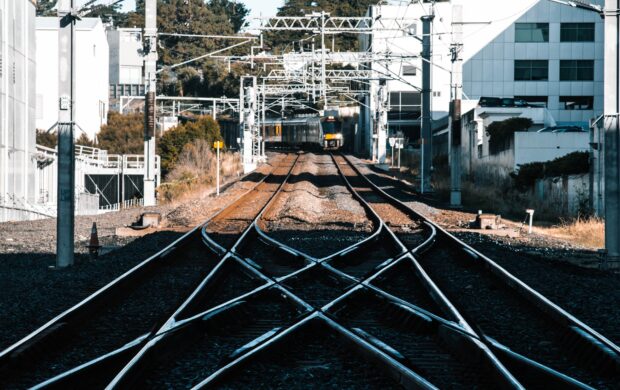

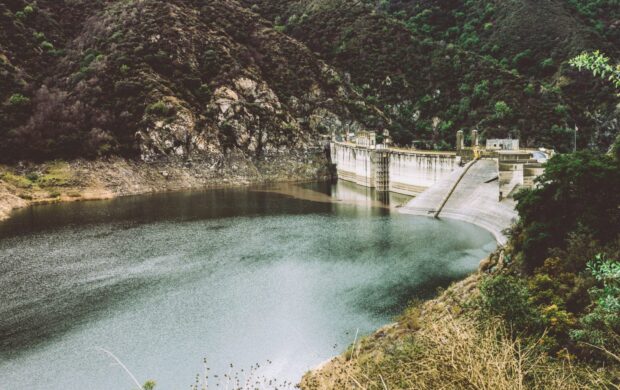








Join discussion